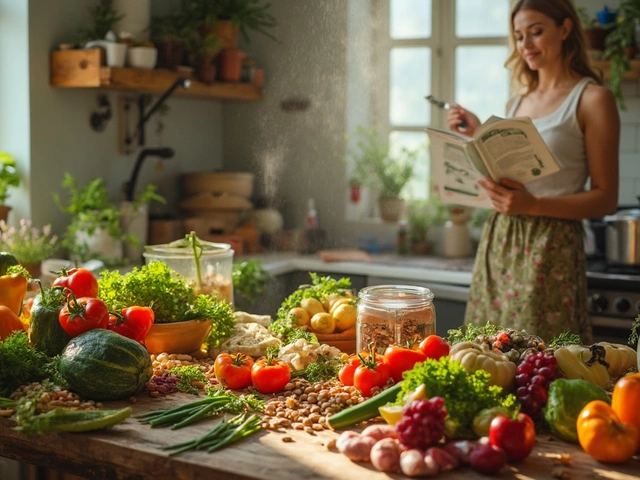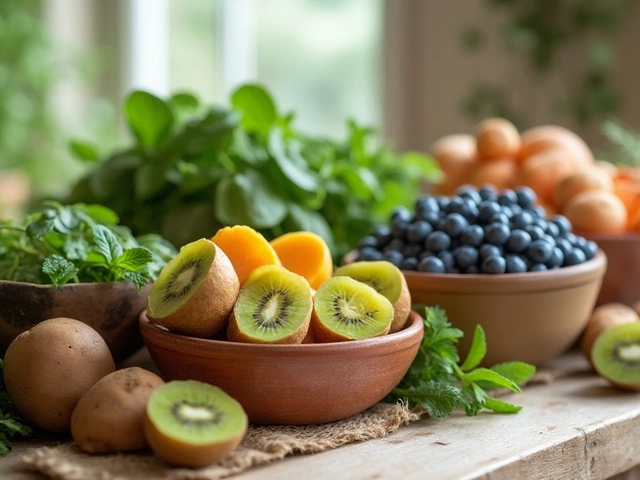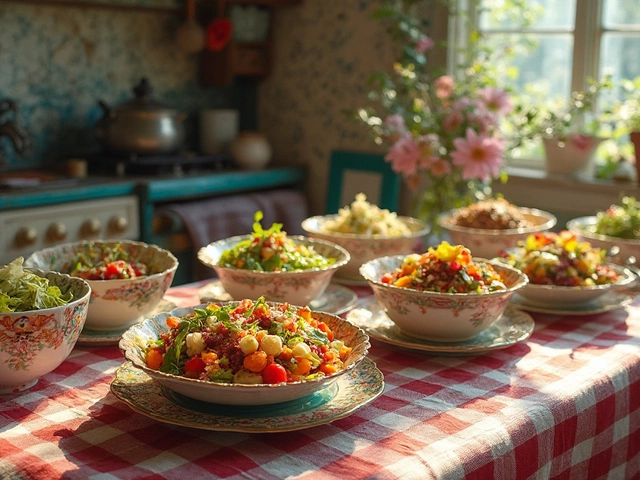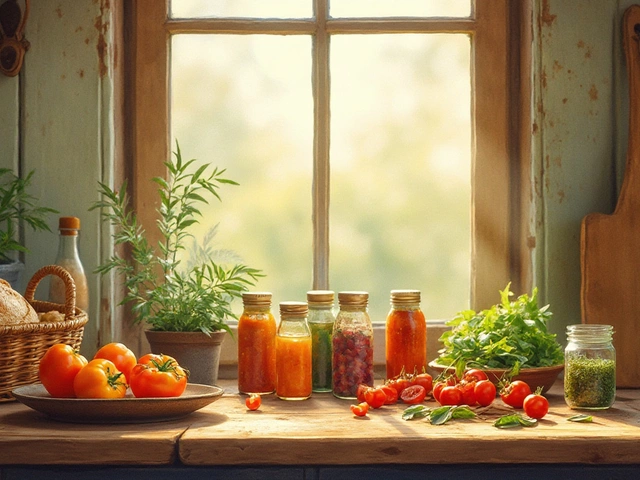People often ask, 'Isn't a vegetarian diet unhealthy?' But guess what, guys, it's actually quite the opposite—with the right balance, of course. Now, I'm not saying it's all carrot sticks and limp lettuce. Nope. The secret? Variety and nutrition!
Some folks worry about missing out on proteins and vitamins, and it's a fair concern. The good news is, you don't need meat to meet (see what I did there?) all your nutritional needs. Think beans, lentils, nuts, and grains. These are protein powerhouses! Plus, they're so versatile you'll never get bored.
Of course, keeping tabs on your nutrients is key, especially stuff like vitamin B12, iron, and omega-3s. Don't panic, though—there are plenty of plant-based sources and fortified foods that got you covered. And let's not forget the wonderful world of supplements if needed.
So, whether you’re a seasoned vegetarian or just flirting with the idea, remember that a thoughtful approach to your meals can lead to a healthier, happier you. Ready to indulge in a world of delicious, veggie-packed goodness? Stay tuned as we dig into some practical tips and recipes that’ll keep you on track!
- Debunking Vegetarian Myths
- Essential Nutrients for Vegetarians
- Balancing Your Vegetarian Plate
- Delicious and Nutritious Vegetarian Recipes
- Tips for a Healthy Vegetarian Lifestyle
Debunking Vegetarian Myths
Alright, so it's time to tackle some of the biggest myths about a vegetarian lifestyle. You've probably heard them all before—isn't it lacking in protein? Won't I be stuck chomping on raw veggies all day? Well, let's set the record straight.
Myth 1: Vegetarians Don't Get Enough Protein
This one's a classic. Believe it or not, getting enough protein on a plant-based diet is totally doable. Foods like beans, lentils, chickpeas, tofu, and even peas are brimming with protein. It's not just about animal products anymore. Many vegetarians get their daily protein levels without a hitch.
Myth 2: Vegetarians Are Iron Deficient
This myth has folks thinking vegetarians are totally depleted of iron. That's just not true. While plant-based iron isn't absorbed as efficiently as meat-based, pairing iron-rich foods with vitamin C boosts absorption. Think spinach with lemon juice or beans with bell peppers. You're good to go!
Myth 3: Vegetarian Diets Are Always Low Calorie
Not exactly. A vegetarian plate can be just as calorie-rich as any other. Nuts, seeds, avocados, and oils are nutritious sources of healthy fats and can add those necessary calories to your meals. Balance is what it's all about.
Let’s Look at Some Numbers
| Nutrient | Daily Need | Vegetarian Sources |
|---|---|---|
| Protein | 50g per day | Tofu, Lentils, Quinoa |
| Iron | 18mg per day | Spinach, Lentils, Pumpkin Seeds |
| Vitamin B12 | 2.4mcg per day | Fortified Cereals, Nutritional Yeast |
The numbers above aren't just random—they show how easy it is for vegetarians to hit their nutritional targets just like everyone else. Crazy, huh?
So, next time someone tries to tell you a vegetarian diet is lacking, pull out these facts. With the right planning, vegetarians can be just as healthy, if not healthier, than their meat-eating pals. A balanced vegetarian lifestyle is about variety and informed choices, not deprivation.
Essential Nutrients for Vegetarians
Going vegetarian is all about finding the right balance to keep your body pumped with the good stuff. Let’s break down the must-have nutrients that keep you healthy on a vegetarian diet. Don’t worry, you won’t need a degree in nutrition to figure this out.
Protein Power
Protein might be the biggie everyone freaks out about, but getting enough isn’t as hard as it seems. Beans, lentils, tofu, and quinoa are vegetarian superstars here. Try throwing them into your meals to keep those muscles happy.
Vitamin B12 Boost
Now, Vitamin B12 doesn’t play easy to get—it hides mainly in animal products. So, how do vegetarians cope? Simple: fortified cereals, plant-based milks, or if you’re feeling fancy, a supplement can do the trick. Keeping those energy levels up without any hassle!
Iron Insights
Here’s a hot tip: iron from plant sources is absorbed better with a shot of Vitamin C. Think about enjoying your spinach salad with a splash of lemon. Other iron-rich favorites include lentils and chickpeas. Yum!
Omega-3 Opportunities
Don’t let omega-3s slide off your radar! Flaxseeds, chia seeds, and walnuts bring in those healthy fats our brains crave. Easy to sprinkle, and your heart will thank you for the boost.
Calcium Connection
Milk’s not the only source of calcium—broccoli, almonds, and fortified plant drinks can keep those bones in tip-top shape. No cow required!
Let’s throw in a cool table to sum things up:
| Nutrient | Sources |
|---|---|
| Protein | Beans, lentils, tofu, quinoa |
| Vitamin B12 | Fortified cereals, plant milks |
| Iron | Spinach, chickpeas, lentils |
| Omega-3 | Flaxseeds, chia seeds, walnuts |
| Calcium | Broccoli, almonds, fortified plant drinks |
So, as you can see, being vegetarian doesn't mean you have to compromise on nutrition. Just keep tabs on these essentials, and you're on a solid path to kickin' it as a healthy vegetarian.

Balancing Your Vegetarian Plate
Alright, let’s get into the nitty-gritty of crafting a vegetarian meal that's wholesome and tasty. The idea is to cover all essential nutrients without missing out on flavor. Because let's be honest, nobody enjoys bland meals.
Protein Power
You might think protein is the hardest part to figure out, but not really. Foods like lentils, chickpeas, and tofu are amazing sources. You’re probably familiar with quinoa, too, right? It’s perfect as it’s a complete protein packed with all nine essential amino acids.
Colorful Carbs
Carbs are not the enemy here! Opt for whole grains like brown rice, whole-wheat pasta, and oats. They’re filled with fiber and nutrients, keeping you full and energized all day. And don’t forget the starchy veggies like sweet potatoes; they're delicious and nutritious.
Fats You Love
Fats aren't something to dodge either! Healthy fats, that is. Avocados, nuts, and olive oil will keep your meals deliciously moist and satisfying. Plus, incorporating these in your meals keeps skin and hair happy too.
Vital Vitamins and Minerals
Leafy greens like spinach and kale are your best pals for iron and calcium. Pair them with some vitamin C-rich foods like bell peppers or oranges to enhance absorption. And keep an eye on your vitamin B12 intake; fortified cereals or supplements might be necessary.
| Food | Main Nutrient | Additional Benefits |
|---|---|---|
| Chickpeas | Protein | Fiber |
| Spinach | Iron | Vitamin C |
| Quinoa | Protein | Fiber |
So there you go! It's all about mixing up your vegetarian meals with a bit of everything to keep your body nourished and your taste buds entertained. Once you get the hang of it, meal prepping becomes second nature, and you’ll be serving up plates that would make any nutritionist nod in approval!
Delicious and Nutritious Vegetarian Recipes
If you're thinking that cooking vegetarian recipes sounds like a real hassle, fear not! Eating vegetarian can be simple, tasty, and packed with nutrition. Let's dive into some nutritious dishes that'll make you glad you chose a plant-based diet.
1. Lentil and Veggie Stir-Fry
This dish isn't just packed with flavor; it's high in protein and fiber too, thanks to the lentils. A veggie stir-fry can be thrown together with whatever you’ve got lying around—it's that flexible!
- Start by cooking a cup of lentils until they're tender.
- In a pan, heat some oil and toss in your favorite vegetables, like bell peppers, broccoli, and carrots. Stir-fry until they're crisp but tender.
- Add the cooked lentils and season with soy sauce, garlic, and a squeeze of lemon.
- Serve hot and enjoy the goodness!
2. Chickpea Salad with Tahini Dressing
Chickpeas are a mighty protein booster. Not to mention, this salad is refreshing and perfect for a light lunch.
- Mix a can of drained chickpeas with diced cucumbers, cherry tomatoes, and red onions.
- For the dressing, blend tahini, lemon juice, a pinch of salt, and a bit of water until smooth.
- Drizzle over the salad, toss well, and you're ready to serve.
3. Veggie-packed Quinoa Bowl
Quinoa isn't just trendy; it’s a complete protein, meaning it provides all nine essential amino acids!
- Cook quinoa according to package instructions.
- Add roasted sweet potatoes, kale, and avocado.
- Top with a splash of balsamic glaze for an extra kick.
Sounds simple, right? Because it is. Remember, keeping a balanced plate is key to vegetarian health. So go on, experiment with these vegetarian recipes and make them yours!
| Nutrient | Vegetarian Source |
|---|---|
| Protein | Lentils, Chickpeas, Quinoa |
| Iron | Spinach, Beans |
| Calcium | Almonds, Tofu |

Tips for a Healthy Vegetarian Lifestyle
So, you're thinking of going vegetarian or maybe you already are. Either way, it's important to keep things balanced for your health to keep up with all the veggies you're munching on. Let's dive into some practical tips to make sure your vegetarian diet is as healthy as it is tasty.
1. Variety is Key
Don’t get stuck eating the same veggies day in and day out. Mix it up! Different foods bring different nutrients, and that's crucial in a plant-based diet.
- Experiment with different fruits and veggies. Ever tried jackfruit? How about quinoa bowls? Get adventurous!
- Rotate your protein sources. Tempeh, tofu, nuts, seeds, and legumes can keep things interesting.
2. Don't Skip on Protein
Yes, you can get enough protein without meat. It's all about knowing where to look.
- Include protein-packed foods like beans, lentils, and chickpeas in your meals.
- Greek yogurt, eggs, and cheese are great if you're not fully vegan.
3. Mind Those Nutrients
A few nutrients often spark concern in vegetarian lifestyles, but with a little awareness, you’re good to go!
- Vitamin B12 can be elusive. Consider fortified cereals or a supplement.
- Iron is another one. Pair sources like spinach with vitamin C from citrus fruits to help absorption.
- Omega-3 might seem like a fishy problem, but flaxseeds and walnuts are excellent plant-based options.
| Nutrient | Vegetarian Sources |
|---|---|
| Vitamin B12 | Fortified cereals, supplements |
| Iron | Spinach, legumes, quinoa |
| Omega-3 | Flaxseeds, chia seeds, walnuts |
4. Cook Up a Storm
The best way to make sure you get all your nutrients is by cooking varied meals. It's also cheaper and often way more delicious than relying on processed foods.
- Dust off that cookbook or browse online for vegetarian recipes. Who doesn’t love a good veggie curry?
- Batch cooking can save you time and ensure you always have a healthy meal ready.
5. Listen to Your Body
Pay attention to how you feel. If you're fatigued or something feels off, it might be worth checking in with a nutritionist.
- Regular check-ups and blood tests can help you stay on top of your nutritional needs.
- Your body will tell you what it needs if you learn to listen to it.
Remember, a healthy vegetarian lifestyle is all about balance and being open to trying new things. Keep these tips in mind, and you're on your way to enjoying a fulfilling and nutritious diet!









Write a comment